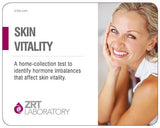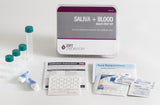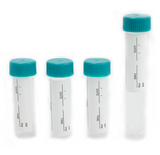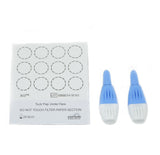The test measures the following hormones and vitamins:
- Estradiol (E2): Estradiol is a form of estrogen primarily produced in the ovaries. It plays a vital role in maintaining skin elasticity, moisture, and overall skin health.
- Estriol (E3): Estriol is another estrogen hormone, typically present during pregnancy. It helps regulate collagen production, leading to improved skin tone and hydration.
- Progesterone (Pg): Progesterone is a hormone essential for menstrual cycle regulation and fertility. Adequate levels of progesterone contribute to healthy skin by controlling oil production and reducing acne breakouts.
- Testosterone (T): Testosterone is commonly associated with male hormones, but it is present in both men and women. Optimal testosterone levels support skin health, promoting a youthful appearance and contributing to oil regulation.
- DHEA-S (DS): Dehydroepiandrosterone sulfate (DHEA-S) is a hormone produced by the adrenal glands. It plays a role in the body's stress response and influences the production of other hormones, including testosterone and estrogen.
- Vitamin D (D2, D3): Vitamin D is crucial for overall health and has been linked to various skin benefits, including improved cell turnover, collagen production, and protection against UV damage.
- Morning Cortisol (C): Cortisol is a hormone released in response to stress. Elevated cortisol levels can contribute to skin issues such as acne, inflammation, and accelerated aging.
- Noon Cortisol (C): Cortisol levels fluctuate throughout the day, and measuring cortisol at noon provides a snapshot of the body's stress response during the midday period.
- Evening Cortisol (C): Evening cortisol levels indicate how the body copes with stress during the later part of the day and can provide insight into potential imbalances or issues with stress management.
- Bedtime Cortisol (C): Cortisol levels at bedtime play a role in sleep patterns and overall recovery. Imbalances in bedtime cortisol can disrupt sleep quality and negatively impact skin health.
- Thyroid Stimulating Hormone (TSH): TSH is produced by the pituitary gland and regulates the thyroid gland's hormone production. Optimal TSH levels are crucial for maintaining healthy metabolism and skin.
By testing these 11 hormones and vitamins, the Skin Vitality Test offers a comprehensive assessment of various factors influencing skin health, hormonal balance, and overall well-being. It provides valuable information that individuals can use to optimize their skincare routines, make lifestyle adjustments, and seek appropriate medical guidance for any identified imbalances.
Key Features
- Comprehensive Hormonal and Vitamin Analysis: The Skin Vitality Test evaluates the levels of 11 essential hormones and vitamins that directly impact skin health and overall well-being.
- Suitable for Both Men and Women: The test is designed to cater to the needs of both men and women, recognizing the importance of hormonal balance and vitamin levels for individuals of all genders.
- Hormone Analysis: The test measures crucial hormones like Estradiol, Estriol, Progesterone, Testosterone, and DHEA-S, providing insights into hormone imbalances that may affect skin quality and appearance.
- Vitamin Analysis: The Skin Vitality Test assesses Vitamin D levels (D2 and D3), which are known for their impact on skin cell turnover, collagen production, and protection against UV damage.
- Cortisol Analysis: The test examines cortisol levels at four different times of the day (Morning, Noon, Evening, and Bedtime), offering a comprehensive assessment of stress hormone fluctuations that may affect skin health and overall stress management.
- Thyroid Function Assessment: The inclusion of Thyroid Stimulating Hormone (TSH) analysis allows individuals to understand the role of thyroid hormones in metabolism and their potential impact on skin condition.
- Insight into Skin Health: By evaluating the key hormones and vitamins related to skin health, the test provides individuals with valuable information about their skin's overall condition, elasticity, moisture, oil regulation, and potential for issues like acne and inflammation.
- Personalized Recommendations: Based on the test results, individuals receive personalized recommendations tailored to their specific hormonal and vitamin imbalances. These recommendations can help optimize skincare routines, make lifestyle adjustments, and seek appropriate medical guidance.
- Holistic Approach to Well-being: The Skin Vitality Test recognizes the interconnectedness of hormones, vitamins, and overall well-being. By addressing hormonal imbalances and vitamin deficiencies, it aims to improve not only skin health but also overall physical and emotional well-being.
- Empowering Self-Care: The test empowers individuals to take charge of their health and make informed decisions about their skincare and lifestyle choices. It provides a deeper understanding of the body's internal factors that contribute to skin vitality.
- Professional Support: The Skin Vitality Test can be conducted under the guidance of healthcare professionals, who can interpret the results and provide further guidance or treatment if necessary.
- Simple testing can reveal whether hormones are secretly sabotaging your skincare efforts.
- The range of hormones tested in the profile can help to identify where hormone deficiencies or excesses that are contributing to skin problems. This can lead to the treatment of previously undiagnosed conditions such as a thyroid disorder or PCOS, or adjustment or initiation of hormone replacement therapy when hormone levels are either too high or too low.
- Test sample collection can be done in the comfort of your home.
- The test is suitable for adults and children
- Free delivery in the UK
- Customers are responsible for shipping their samples to the laboratory.
- The test kit includes a laboratory fee: no additional laboratory cost and tax.
- The Test Result Report: You will receive your test result report via email within 3-5 working days after Laboratory receives your sample. On your test result, you will see your hormone levels in graphics and numbers. You will also see Laboratory's comments by Hormone Specialist PhD Dr who will explain the reason for hormonal imbalance if there is any and what to do next. Skin Vitality Hormone Test Pack Includes:
Skin Vitality Test Pack Includes:
- Test Requisition Form includes Symptom Checklist
- Requisition Form to complete including your personal and medical history
- Contains collection instructions
- Vial(s) for collecting saliva and lancet (finger pricks) with blood (dry blood spot) Card
- Instructions on how to use Collection Kit
- Return Envelope
- Shipping instructions
Bad Skin? It Could Be Your Hormones
Do the following symptoms sound familiar?
Increased wrinkles, decreased skin elasticity, acne / oily skin, melasma (dark patches) or erythema (redness), hirsutism (excessive hair) or hair loss, myxedema, male pattern baldness, puffy eyes/face; dry, thinning skin/hair/eyebrows; brittle nails, skin rashes / eczema, sleep deprivation, skin dryness, thinning or rough, coarse skin, slow wound healing, increase or decrease sweating.
If two or more of these symptoms persist, testing can identify whether it's a hormone imbalance.
Why Skin Vitality Hormone Test?
- Individuals with thinning skin and hair with low thyroid symptoms.
- Individuals with unexplained skin rashes, eczema or psoriasis.
- Over-stressed women with premature wrinkling - as young as 30
- Women with PCOS-related hirsutism or male pattern baldness
- Teens or adults with acne
Hormone imbalance can be an underlying factor for a wide variety of dermatological symptoms. Testing can help to identify:
- Skin ageing linked to hormone deprivation
- The hidden causes of chronic, unexplained skin conditions.
- Monitor hormone levels in people using skin creams and topical anti-ageing treatments to detect possible over-exposure to hormones absorbed through the skin.
Advantages
- Measures bioavailable hormone levels
- Reflects absorption of hormones in topical skin treatments
- Test report correlates hormone levels with symptoms.
- Shelf-stable samples shipped back via regular mail.
- No phlebotomist required
Hormones and Skin
Everyone wants healthy, radiant skin, but popular cosmetic cover-ups and anti-ageing creams that work on the surface don't get to the root of stubborn skin problems.
Diet, stress, sleep loss and sun damage are several obvious factors that influence how the skin looks. Far less obvious - and often overlooked - is the hormonal connection that is vital to youthful skin.
Hormones are intrinsically involved with all processes affecting the maintenance of skin health. Such as collagen content, skin lipid levels, elasticity, wound healing, moisture content and facial hair patterns. Not only is skin a major target of hormone action, but it is also a site of local hormone synthesis, as well as hormone activation and metabolism. A major cause of skin thinning/ fragile skin, wrinkling, and dryness is a deficiency in hormones, such as estrogen and progesterone in women, and testosterone in men. While an excess of androgens can result in oiliness, acne, and either hirsutism or hair loss, and excess estrogen can cause a dark discolouration known as melasma. Thyroid dysfunction also has a significant impact on skin health, resulting in conditions ranging from itching to myxedema. As a result of the hormonal imbalance, there are increasing numbers of patients seeking help from dermatologists and estheticians for their skin problems.
Hormone testing is a first step towards getting at the root of the problem instead of just treating symptoms.
How Hormone Imbalance Impacts Skin
Diets high in sugars and refined carbs stimulate overproduction of the androgens (testosterone and DHEA), triggering acne and oily skin, and potentially excess facial or body hair. High cortisol stress hormones also disrupt with skin rashes and breakouts.
Likewise, stress, smoking, junk food and lack of sleep can accelerate hormone losses, making us look old before our time.
With such a high concentration of hormone receptors in the skin - especially on the face - it's no wonder that signs of premature ageing are more obvious there.
The Role of Hormones in Skin Health
Estrogens
Skin is one of the main sites of estrogen action, where it plays a role in maintaining skin glycosaminoglycan content, which retains moisture and inhibits collagen degradation, maintaining skin thickness. Reduced availability of estrogens, therefore, affects skin health in a number of ways. These include wrinkling, dryness, skin thinning, slower wound healing, and loss of elasticity. Because facial skin has much higher concentrations of estrogen receptors than the skin of the breast or the thigh, the effects of declining estrogen levels as women age are more obvious on the skin of the face than on the skin covering other parts of the body.
High estrogen levels can also be problematic. Melasma is a dark discolouration of the skin that is associated with female hormone activity and exacerbated by exposure to sunlight. It is seen in up to 70% of women who are pregnant when estradiol and progesterone levels are high and in up to one-third of women using oral contraceptive pills or postmenopausal hormone replacement therapy. Expression of estrogen receptor β and progesterone receptors has been observed to be increased in biopsies of melasma-affected skin compared to neighbouring, unaffected skin.
Studies of estrogen replacement therapy have shown an improvement in skin properties affected by low estrogen levels, such as increased collagen content, skin thickness, and skin elasticity, as well as an increase in skin surface lipids, which enhances the barrier function and may prevent dryness.
Estriol has weak estrogenic activity, but has anti-ageing effects on the skin when applied directly to the skin; topical estriol can be used alone or in combination with systemic estrogen replacement therapy, to maximize skin benefits. Some topical preparations can contain excessive amounts of estriol, which can cause problems of estrogen excess as well as downregulating receptors so that skin problem may actually worsen with continued treatment; it is, therefore, important to test estriol to ensure that levels are within a normal range.
Androgens - Testosterone and DHEA-S
Skin thinning, and other symptoms associated with estrogen deficiency can also occur in people with androgen deficiency because there is less testosterone available for local conversion to estrogen through the action of aromatase present in the skin. Low testosterone in both women and men is associated with thinning skin and impaired wound healing. Testosterone replacement in men has an anabolic effect, increasing tissue protein synthesis, and has been found to increase skin thickness. In women, low testosterone and DHEA-S are associated with increasing age, but particularly low testosterone is found in women who have had surgical menopause (removal of the ovaries) and this has an impact on overall health and vitality. DHEA-S is a precursor to testosterone and estradiol, so low levels of DHEA-S affect the availability of these hormones to carry out their functions.
While androgen deficiency is more often seen in older age groups, skin problems associated with androgen excess can occur in younger people and are seen around the time of puberty, in polycystic ovarian syndrome (PCOS), in patients with congenital adrenal hyperplasia, or in people using exogenous hormones. Dihydrotestosterone (DHT) is the active metabolite of testosterone that, in excess, contributes to the development of acne in both men and women, and in the skin of the scalp it is responsible for “male pattern baldness”. In androgen excess conditions in women, hirsutism including unwanted facial hair growth is also seen. Progesterone reduces the activity of 5-alpha reductase, which converts testosterone to DHT, therefore a progesterone deficiency may worsen unwanted effects of excess androgens on the skin. Test results showing high testosterone and DHEA-S levels, especially when estradiol levels are normal, can help diagnose PCOS in women presenting with skin disorders such as acne or hirsutism.
Progesterone
Progesterone has been used in cosmetic skin creams as well as in hormone replacement therapy and has been found to improve skin thickness and elasticity. Low progesterone levels are thought to increase the impact of androgens on sebaceous glands and body and head hair. This is because progesterone reduces 5-alpha reductase activity, which converts testosterone to its active metabolite dihydrotestosterone (DHT).
Cortisol
The diurnal cortisol (morning, noon, evening and bedtime) test is a good indicator of adrenal function and exposure to stressors, which results in dysregulation of the hypothalamic-pituitary-adrenal axis causing cortisol levels to remain low under chronic stress. Stress is known to affect the skin, causing acne breakouts and rashes, and low cortisol associated with chronic stress can exacerbate immune disorders affecting the skin such as psoriasis. The emerging field of psychodermatology links many skin disorders with emotional and psychological problems.
Thyroid Hormones
Skin health is significantly affected in multiple ways by thyroid diseases. Thyroid-stimulating hormone (TSH) testing can indicate the presence of a thyroid disorder that may be contributing to skin problems. Autoimmune thyroid disease can result in skin conditions such as urticaria (itching), rashes, including eczema, and scleroderma. Myxedema is a classic skin condition associated with hypothyroidism and is caused by edema due to increased glycosaminoglycan deposition. Hypothyroidism can also be associated with skin dryness as a result of decreased sweating and reduced sebum production, pale skin colour, and rough, scaly skin. Some hair loss can also be seen in hypothyroid individuals, notably in the eyebrows where the outer third of the eyebrow can disappear entirely. Graves Disease, an autoimmune disease associated with enlargement of the thyroid gland and overproduction of thyroid hormones, is associated with thickening of the outer layers of the skin and increases in skin pigmentation, erythema (redness), smoothness, and sweating.
Vitamin D
Adequate vitamin D is essential for a proper immune system function. A compromised immune system can exacerbate skin disorders and is linked to such conditions as psoriasis, acne, and slow wound healing. The active form of vitamin D, calcitriol (1,25-dihydroxy vitamin D), and some vitamin D analogues are being used successfully in the topical treatment of plaque psoriasis. Vitamin D and its receptors in the skin are also involved in the regulation of epidermal proliferation and differentiation for the maintenance of skin structure and its barrier function, hair follicle cycling, and suppression of tumour cell formation. Testing for adequate vitamin D levels can show whether vitamin D deficiency is contributing to skin problems.
Hormone-containing Cosmetic Creams
Because of the efficiency of the skin in absorbing systemically active hormones, topical hormone preparations, such as creams, gels, and patches, are widely used for hormone replacement in both postmenopausal women and men. Topical preparations can be dosed at much lower levels because of the avoidance of first-pass liver metabolism undergone by orally-administered hormones.
Cosmetic creams containing hormones, most commonly estriol, are both prescribed and sold over the counter as anti-ageing products. Practitioners should be aware that hormones applied to the skin for cosmetic purposes, just like other hormone replacement products, have systemic effects, and should be monitored with saliva testing. Conventional blood tests do not reflect topical hormone usage, because hormones applied to the skin are rapidly delivered to tissues and do not stay in the bloodstream; however, saliva testing can be used to show the extent of absorption of the topically-delivered hormone.
Excessive amounts of estriol and other estrogens can be dangerous, especially when exposure is inadvertent or unmonitored. There are published reports of young children with prepubertal gynecomastia and other pubertal changes as a result of inadvertent exposure to estrogen-containing products, including custom-prescribed estrogen creams used by their mothers.
Also, the over-use of cosmetic products containing estrogens may result in estrogen-dependent cancers. Saliva testing can indicate whether hormone exposure as a result of the use of cosmetic products is excessive, and it can ensure that hormone levels are kept within a physiological range after prescription of hormone-containing creams for cosmetic purposes.











